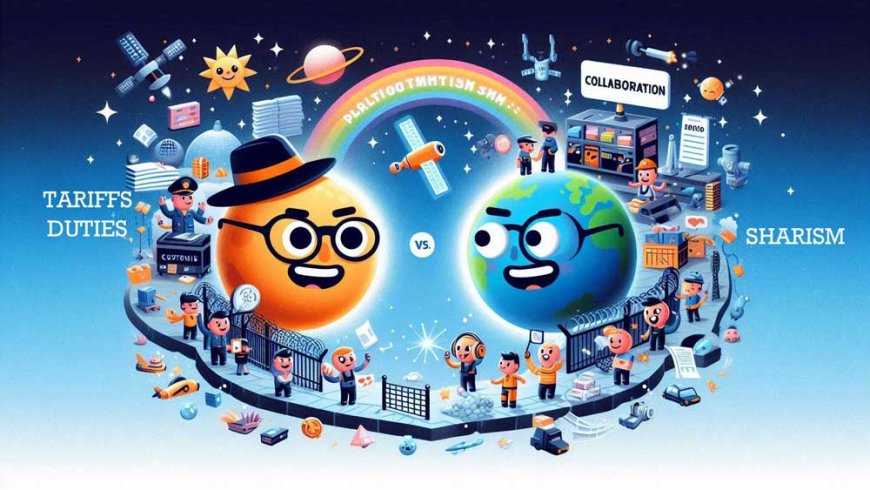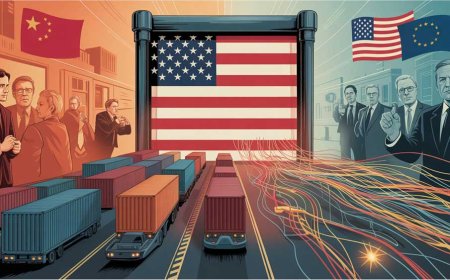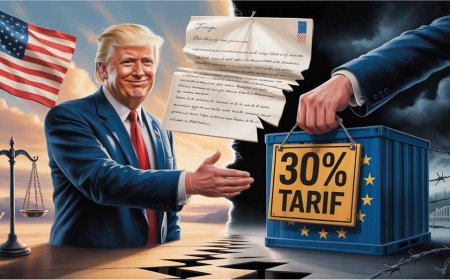Sharism vs. Protectionism: A New Paradigm for Global Prosperity
Sharism vs Protectionism explores the balance between open sharing and protective economic policies in today’s interconnected world. The article discusses how Sharism fosters global collaboration and sustainable progress, contrasting it with protectionist strategies that impose trade barriers and limit knowledge flow. This article examines the dynamic between Sharism—a philosophy advocating open knowledge sharing and collective growth—and Protectionism, which relies on tariffs and trade restrictions. It highlights the impact of these opposing approaches on global trade, innovation, and sustainable development in a connected world.

In recent years, protectionism has re-emerged as a dominant force in global economic policies. Driven by geopolitical tensions, trade wars, and systemic instability, it manifests through tariffs, trade barriers, domestic subsidies, and market restrictions. While it may address short-term needs for economic defense, protectionism risks deepening divisions, increasing inequality, and fueling social and global tensions, ultimately stalling innovation and exacerbating global fragmentation.
In this context, Sharism stands out as an alternative and proactive paradigm, designed to counter the spread of protectionist models by promoting openness, shared access, collaborative innovation, and mutual value creation across sectors, territories, and communities. Far from being an idealistic vision, Sharism supports a more interconnected, sustainable, and inclusive economy, where the flow of ideas, data, and solutions becomes a driver of growth—not a target of restriction or destructive competition.
To advocate for Sharism today is to offer a way out of the current deadlock between unchecked globalization and economic nationalism—fostering a dynamic balance between strategic autonomy and active cooperation.
The question we now face is clear: In an era of global interdependence, which model best serves humanity’s collective future?
Protectionism: Walls Around the Past
Historically, protectionism has been used to shield domestic industries from foreign competition. Through tariffs, import quotas, subsidies, and regulatory barriers, governments attempt to preserve jobs and national capabilities. And in certain short-term or strategic contexts, these policies can be justified.
However, in today’s interconnected world, protectionism often becomes:
- A barrier to innovation, especially in fast-moving sectors like tech and biotech
- A driver of inflation, limiting access to competitive goods
- A cause of trade friction and retaliation among nations
- A hindrance to solving global challenges that require collaboration
Protectionism may win headlines. But its long-term effects can include economic inefficiency, isolation, and missed opportunities for shared growth.
Sharism: The New Operating System for Progress
By contrast, Sharism is a model that reimagines prosperity as something that grows through openness, connection, and collective intelligence. It is not anti-market or anti-ownership — it simply emphasizes value creation through sharing instead of hoarding.
Sharism operates under the belief that:
- Knowledge grows when it’s shared
- Innovation accelerates through collaboration
- Ecosystems thrive when diverse players contribute
- Progress becomes more equitable when barriers are removed
It’s the ethos behind open-source software, Creative Commons, open innovation hubs, and international scientific cooperation. It aligns with the digital age, where data, ideas, and tools can be exchanged instantly — and where the next big breakthrough might come from anywhere.
Protectionism and the Cost of Tariffs
Protectionism’s traditional tool — the tariff — has resurged in many regions, framed as a way to “protect local jobs” or “punish unfair trade.” But the reality is often different.
Tariff Impacts:
- Consumers pay more due to higher import costs
- Domestic industries lose incentive to innovate
- Retaliatory tariffs harm exporters and small businesses
- Global supply chains suffer, increasing costs and delays
According to multiple studies, tariff wars often reduce GDP, hurt global trade, and shift — rather than solve — systemic economic challenges.
???? Sharism as Economic Strategy
Sharism isn’t just a philosophical idea — it’s a strategic framework for building resilient, inclusive, and adaptive economies.
Economic Benefits of Sharism:
✅ Boosts productivity through shared R&D and pooled resources
✅ Reduces inequality by lowering entry barriers for underrepresented regions and entrepreneurs
✅ Increases resilience by distributing risk and knowledge across networks
✅ Encourages sustainable development by supporting circular economy practices
✅ Enables faster innovation cycles, especially in AI, health tech, and climate solutions
It transforms "competitive advantage" into "collaborative advantage."
???? Protection or Participation? Time to Choose.
The challenges we face today — pandemics, climate change, digital disruption, inequality — are global in nature. Addressing them requires not fortresses, but federations; not zero-sum thinking, but shared value creation.
Sharism invites us to rethink how we innovate, trade, and grow. It doesn’t reject regulation or national interests. Instead, it integrates trust, transparency, and technology to build economies that are both competitive and compassionate.
As business leaders, policymakers, entrepreneurs, and global citizens, we must ask:
Do we invest in barriers — or in bridges?
Do we fear the “other” — or empower the collective?
Will we protect yesterday — or share in building tomorrow?
Let’s bring the conversation forward. What are your thoughts on Sharism vs. Protectionism in your sector? https://sharism.wiki or https://sharism.one
What's Your Reaction?


































